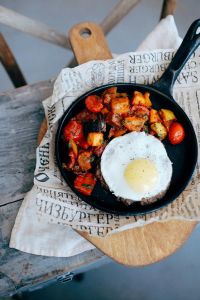In the world of culinary arts, few think of practicality as much as cast iron cookware. From its durability to its versatility, cast iron has been a staple in kitchens for centuries, and its popularity shows no signs of waning. Let's delve into what makes cast iron so beloved and why it might just be the perfect addition to your kitchen arsenal.
The Timeless Appeal
Durability: One of the most enduring qualities of cast iron cookware is its durability. Unlike many modern cooking materials, cast iron is virtually indestructible. With proper care, a cast iron skillet or pot can last for generations, making it a worthy investment for any kitchen.
Even Heating: Cast iron heats evenly and retains heat exceptionally well. This property makes it ideal for cooking a wide range of dishes, from searing steaks to baking cornbread. Once heated, a cast iron pan maintains a steady temperature, allowing for precise cooking control.
Culinary Versatility
From Stovetop to Oven: One of the standout features of cast iron cookware is its ability to seamlessly transition between stovetop and oven. You can start by searing meat on the stove and then transfer the entire pan into the oven to finish cooking. This versatility makes cast iron perfect for dishes that require both stovetop and oven cooking techniques.
Non-Stick Properties: When properly seasoned, cast iron develops a natural non-stick surface that rivals even the best non-stick cookware. This makes it great for cooking eggs, pancakes, and delicate foods without worrying about sticking.
Practical Considerations
Health Benefits: Unlike many non-stick pans that can release harmful chemicals when overheated, cast iron is completely safe to cook with at high temperatures. It adds small amounts of iron to your food, which can be beneficial for those who are iron-deficient.
Easy Maintenance: Contrary to popular belief, maintaining cast iron cookware is straightforward. Regular seasoning and proper drying are key to keeping your pans in top condition. Over time, your cast iron cookware will develop a patina that enhances its non-stick properties and adds to its unique character.
Tips for Using Cast Iron
Seasoning: Before using your cast iron for the first time and periodically thereafter, season it with a thin layer of oil to create a non-stick surface and protect against rust.
Cleaning: Avoid using soap or harsh detergents, which can strip away the seasoning. Instead, use hot water and a stiff brush to clean, and always dry thoroughly to prevent rust.
Storage: Store your cast iron cookware in a dry place. If stacking, place a paper towel between pans to prevent moisture buildup.
Cast iron cookware represents more than just a tool for cooking—it embodies a connection to culinary traditions and a commitment to quality. Whether you're a seasoned chef or a novice cook, adding a cast iron skillet or Dutch oven to your kitchen can elevate your cooking experience and provide a lifetime of culinary enjoyment. Embrace the timeless appeal and practicality of cast iron, and discover why it's been a beloved kitchen essential for centuries.


